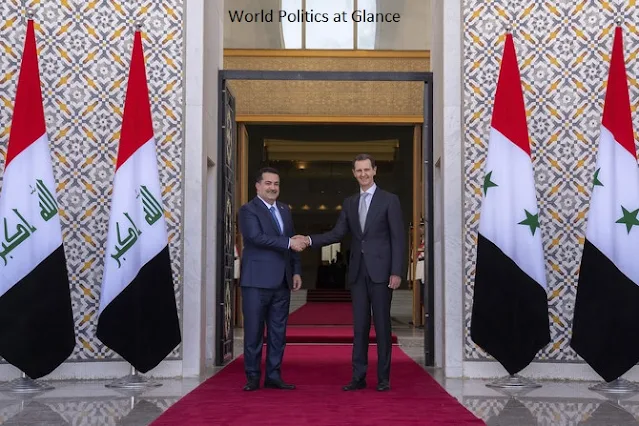 |
| Iraq's PM and Syrian President Image Credit: Google |
Iraqi PM Historic Visit to Syria: Strengthening Bilateral Ties Amid Regional Challenges
In a
significant move, Iraq's Prime Minister, Mohammed Shia al-Sudani, visited
Syrian President Bashar al-Assad in Damascus, marking the first such visit
since the 12-year conflict began in Syria.
The meeting
reflects the enduring ties between Iraq and Syria, despite regional upheavals
and international isolation.
This article
explores the key points of discussion during the meeting and their implications
for both countries' domestic and regional challenges.
1. Strong Historical Ties and Ongoing Cooperation
Iraq and Syria
have shared close relations over the years, maintaining their partnership even
as other Arab countries withdrew their ambassadors from Damascus and Syria's
membership in the Arab League was suspended in 2011.
Both leaders
reaffirmed their commitment to further enhance bilateral cooperation,
particularly in the fight against cross-border drug trafficking and terrorism.
2. Addressing the Refugee Crisis and Ensuring Safe Returns
With Syria's
conflict causing immense human suffering, Iraq has played a crucial role in
hosting around 250,000 Syrian refugees.
Prime Minister
al-Sudani expressed Iraq's commitment to work with the Syrian government to
ensure a safe and voluntary return of refugees to their homeland once stability
is restored.
This commitment
underscores Iraq's willingness to assist in resolving the humanitarian crisis in
Syria.
3. Water Shortages and Drought Mitigation
Both nations
discussed water shortages in the Euphrates River, a vital resource that flows
through both countries.
Upstream
damming by Turkey has exacerbated the issue, leading to drought conditions in the
region.
The leaders
emphasized the need for cooperation to ensure fair water distribution and
combat the adverse effects of climate change, an essential step in preserving
their shared natural resources.
4. Fighting the Impact of Terrorism and ISIL's Defeat
Iraq and Syria
have faced immense challenges from terrorism, most notably the rise of the
Islamic State (ISIL).
The defeat of
ISIL in both countries was a significant achievement, and now, with the group
weakened, the leaders aim to bolster their joint efforts in combating
terrorism, further solidifying their security partnership.
5. Regional Implications and Iran's Influence
The 600km-long
(373-mile) border between Iraq and Syria underscores their strategic proximity.
Iran's
influence in both countries plays a crucial role in shaping regional dynamics,
and this visit could signal deeper regional cooperation between Iraq, Syria,
and Iran.
6. Ending Syria's Isolation and Rejoining the Arab League
Syria's recent
reinstatement to the Arab League marked a significant step in ending its
isolation in the region.
The meeting
between the Iraqi and Syrian leaders signifies Iraq's support for Syria's
reintegration into the Arab fold and its efforts to rally international support
for lifting punitive Western sanctions on Syria.
Analysis and Recommendations
1.
Strengthening
Bilateral Cooperation:
The meeting
between Iraq's Prime Minister and Syrian President signifies a significant step
towards strengthening bilateral ties.
By prioritizing
cooperation on cross-border drug trafficking, fighting terrorism, and
addressing water shortages, both countries can work together to enhance
regional stability and security.
Continued
engagement and diplomatic dialogue will be essential in further solidifying
their partnership.
2.
Humanitarian
Crisis and Refugee Return:
As Syria's
conflict continues to have far-reaching humanitarian consequences, Iraq's
commitment to facilitating the safe and voluntary return of Syrian refugees is
commendable.
However, both
nations must ensure that conditions in Syria are genuinely stable and conducive
to repatriation.
Collaboration
with the international community and regional organizations will be crucial in
providing support for the return process and ensuring the well-being of
returning refugees.
3.
Water
Resource Management:
The discussions
on water shortages in the Euphrates River highlight the importance of
sustainable water resource management.
Both Iraq and
Syria, along with Turkey, must engage in constructive dialogue to find
equitable solutions to water distribution challenges.
International
organizations and regional actors can play a facilitating role in these
negotiations to ensure fair and effective water management.
4.
Regional
Stability and Counterterrorism Efforts:
The joint
commitment to fighting terrorism is of utmost importance, especially
considering the defeat of ISIL in both countries.
Strengthening
intelligence-sharing mechanisms and coordination in border security will be
critical in preventing the resurgence of extremist groups.
Moreover,
regional partners can work together to address the underlying grievances and
socioeconomic factors that contribute to the radicalization of vulnerable
populations.
5.
Regional
Integration and Diplomacy:
Iraq's support
for Syria's reinstatement to the Arab League reflects the potential for
regional integration and cooperation.
Both countries
can utilize their diplomatic influence to foster dialogue and rapprochement
with other Arab nations, thereby further breaking Syria's isolation and
enhancing its role in regional affairs.
6.
Managing
Iran's Influence:
Given Iran's
significant influence in both Iraq and Syria, managing this influence
responsibly will be essential in maintaining regional stability.
It is crucial
for both countries to balance their relationships with Iran while safeguarding
their sovereignty and national interests.
Engaging in constructive regional dialogue can help address concerns and build confidence among neighboring countries.
(Courtesy: Al-Jazeera
Post a Comment
0Comments